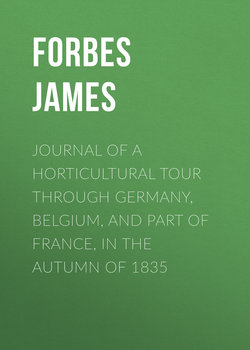Читать книгу Journal of a Horticultural Tour through Germany, Belgium, and part of France, in the Autumn of 1835 - Forbes James - Страница 2
PREFACE
ОглавлениеThe continental gardens and botanical collections having been rarely visited by the British gardener, his Grace the Duke of Bedford, with his usual anxiety for the promotion of useful knowledge, very liberally and kindly proposed in the autumn of 1835 that I should undertake a Horticultural Tour, through several parts of Germany, Belgium, and France, with a view of inspecting the different collections and productions cultivated in some of the most celebrated horticultural establishments in these countries.
The notes which are now submitted to the public contain a cursory detail of the various gardens and objects that came under my observation during a tour occupying a space of eight weeks, – a period of time which the reader will readily understand required the utmost diligence on my part to fulfil the objects I had in view. Yet I was enabled to investigate such modes of culture as were adopted in the principal gardens, where the produce appeared in any way superior to our own; to become thoroughly acquainted with the different systems practised at various seasons of the year would have required an actual residence of many months.
In the mode of forcing fruits and management of the kitchen garden department, the English gardener will find but little abroad superior to what he is daily accustomed to see at home. It must however be observed that the zeal and anxiety displayed throughout Germany in the cultivation and increase of their collections of plants are in no way inferior to our own. In fact, in succulent plants they far surpass us; more particularly in their collections of Cacteæ, which appeared to be a favourite tribe in the principal establishments on the continent. They are certainly deserving of a more extensive cultivation in this country than they have hitherto obtained. Their various shapes, numerous spines, angles, and the splendid flowers of many of the species, form an interesting and pleasing addition to our botanical establishments; and of all plants requiring the protection of the greenhouse and artificial heat, the Cacteæ may be cultivated at the least expense, and exact less attendance than is generally requisite for hothouse plants. The Palmæ are also extensively cultivated throughout the continent, and notwithstanding many of them are planted in gloomy habitations they were in general very healthy, and evidently more suitable inhabitants for such structures than the deciduous or hard-wooded species. The hothouses erected for the cultivation of plants throughout the Prussian dominions consist of opaque roofs, furnished only with upright lights, which are ill adapted for the flowering or bringing to perfection many of the tender species.
In most parts of Germany the pleasure grounds are very deficient in evergreens, frost being so intense in that country that the Rhododendron ponticum, Arbutus, Laurustinus, Daphne, Portugal, and even common Laurel, require the protection of the greenhouse during the winter season. If these grounds, however, are deficient in evergreens, they are richly decorated, in most instances, with ornamental vases, statues, and numerous groups of fine sculpture, which contribute greatly to the embellishment of a pleasure-ground. As far as architecture and sculpture are concerned, the continental royal gardens far surpass those in England; but there did not appear to me in the quarters I visited to be a spirit for garden-improvement equal to that which is so generally prevalent in this country.
It now only remains for me to take this opportunity of returning my thanks to those whose kindness afforded me considerable facilities in viewing the different gardens described in this tour; they are, however, more especially due to those horticulturists of Germany by whose liberality I have been enabled to add above six hundred new and curious plants to the splendid collection at Woburn Abbey, entrusted to my care; and I must add, that I found a cheerful inclination, in most instances, to enter into a correspondence for the mutual exchange of plants and seeds. The few remarks on different objects, not immediately connected with Horticulture, which I have ventured to introduce, will it is hoped be received with that indulgence which my imperfect acquaintance with such matters may require.
J. F.
